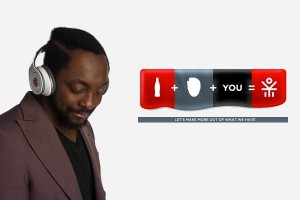Coca-Cola’s new brand turns PET bottles into a fashion statement
Coca-Cola is hoping its new brand initiative will have consumers thirsty for recycled content in fashion and other consumer products. 
Global musical artist and producer will.i.am and the beverage giant joined forces to create the EKOCYCLE brand, which is dedicated to help push for sustainability into peoples’ lives by offering lifestyle products made in part from recycled content. Coke’s brand name, spelled backwards, “EKOC” – is embedded into the EKOCYCLE moniker.
Coca-Cola spokesperson Susan Stribling told PlasticsToday that the EKOCYCLE brand intends to educate people about every day recycling choices. Coca-Cola will make a minimum $1 million financial commitment over the next five years.
“By making recycled products more attractive to people, EKOCYCLE will help create a greater business incentive to include recycled content, such as plastic bottles, in consumer products,” she said. “Empty containers will be viewed as valuable instead of as waste.”
Beats by Dr. Dre and New Era were the first brand partners to join the EKOCYCLE brand initiative. Adidas and the NBA have partnered on the latest EKOCYCLE product, which featured a limited edition Adidas t-shirt.
Stribling said that individual EKOCYCLE brand partners are responsible for manufacturing their products. The process provides a defined supply chain of recycled materials, purpose-built for the waste of one product to create another product.
All products marketed under the EKOCYCLE brand are required to contain recycled content as appropriate for that product. The amount of recycled content in each product varies and will be driven by a number of factors, including the technical feasibility of using recycled content in the manufacturing of the product and the availability of compatible recycled material, she said.
Current EKOCYLE products use a minimum of 25% recycled content. For instance, the Adidas and NBA shirts are made with 50% rPET and 50% organic cotton, with the rPET component comprised of three assorted recycled PET bottles.
While each EKOCYCLE product contains recycled PET plastic bottles, Stribling said the type of bottle that is used varies. The recycled content comes from various certified and authenticated recycling plants from around the world. Each product includes an identifier that details how many bottles were recycled to make the product.
“The products can contain recycled content made from Coca-Cola bottles or other bottles,” she said. “Our belief is that is important to encourage recycling and reuse of all bottles and cans, regardless of from where they originate.”
Though they don’t have specific data to share, Stribling said the company believes the demand for recycled content in products is growing.
At this point, Stribling said it is too early to provide any specific estimates of the impact EKOCYCLE can have on diverting packaging from the landfill.
“EKOCYCLE was created to show people that through recycling they can help provide materials for another product and decrease the packages that end up in landfills,” she said. “EKOCYCLE gives people a simple way to get involved – both on the front end, by recycling their beverage bottles – and on the backend, by purchasing EKOCYCLE products.”
Zero waste goal
Stribling said one of the most notable ways the company is focused on sustainable packaging is with its Plant Bottle. The 100% recyclable PlantBottle packaging is made from up to 30% plant-based material, and the company is working toward a 100% plant-based bottle as well.
She said they continue to invest in the development of other ways to create more environmentally responsible packaging. A global goal is to source 25% of its PET plastic from recycled or renewable material by 2015.
Looking forward, the company’s big long-term goal is zero waste, and Stribling said Coca-Cola has invested significantly in sustainable innovation and recycling initiatives to turn packaging into a resource for future use.
The steps they are taking to advance a zero waste vision include lightweighting, which the company is working to improve packaging material efficiency per liter of product by 7% by 2015, compared with a 2008 baseline.
In North America, the company’s is striving toward recycling 100% of its packaging footprint by recovering an equivalent bottle and can for every one they place in the market. Currently, they recover approximately 43%.



































